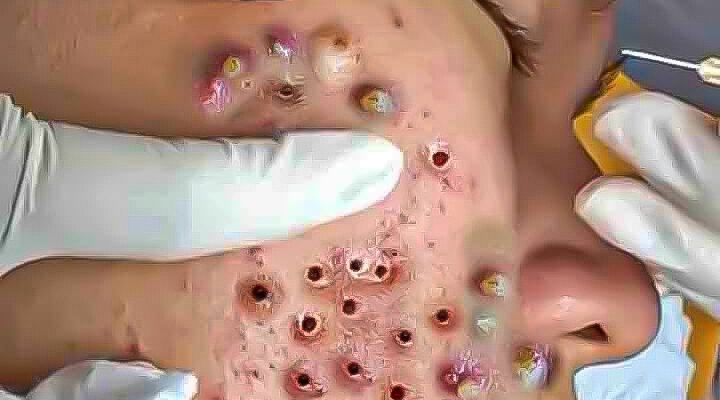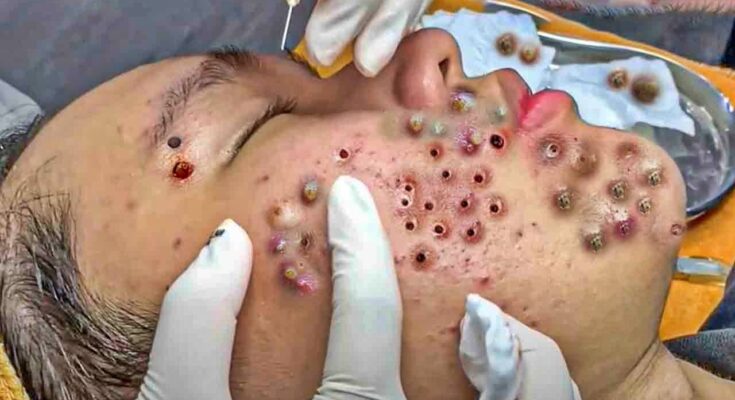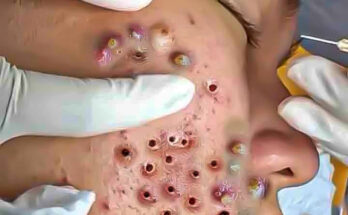This Is What Your Remove Blackheads Should Popping
Blackheads are a common skin concern that many people experience, especially in areas like the nose, chin, and forehead. While the temptation to pop blackheads is often strong, it is important to understand why this might not be the best approach for your skin. In this article, we’ll dive into the science behind blackheads, why popping them can be harmful, and how to safely remove them without causing damage.
1. Introduction: Understanding Blackheads
- What are blackheads? Blackheads are a type of acne, specifically open comedones. They form when hair follicles become clogged with oil, dead skin cells, and bacteria. Unlike whiteheads, the top of the blackhead is exposed to air, causing the debris inside to oxidize and turn black.
- The Causes of Blackheads Several factors contribute to the formation of blackheads, including excess sebum production, hormonal changes, poor skincare habits, and even environmental pollutants.
- The Appeal of Popping Blackheads Popping blackheads seems like a quick solution. The visible, often unsightly appearance of blackheads can lead people to think they’re removing a foreign object from the skin. However, this action might cause more harm than good.
2. The Science Behind Blackheads
- Sebum Production and Clogging Pores Sebum, produced by sebaceous glands, is an oily substance that helps keep the skin moisturized. However, when too much sebum is produced, it can mix with dead skin cells, creating a plug that blocks hair follicles.
- Why Blackheads Appear Dark The dark color of blackheads is caused by the oxidation of the trapped sebum when exposed to air. This is different from a whitehead, where the pore remains closed, and the trapped oil doesn’t oxidize.
3. Why Popping Blackheads Is Harmful
- Increased Risk of Infection When you pop a blackhead, you break the skin’s surface, which can lead to the introduction of bacteria. This can cause an infection, inflammation, or worse, the development of more acne.
- Scarring and Hyperpigmentation Picking at blackheads can cause scarring. Even after the blackhead is removed, the pressure exerted on the skin may leave a mark, which can turn into hyperpigmentation over time.
- Spread of Acne Popping blackheads can push the material deeper into the skin, causing the clogged pore to become infected and possibly leading to more acne, such as cysts or pimples.
- Worsening the Problem Although popping may seem like it clears the pore, it often doesn’t. Many people do not fully extract the contents, leaving behind a part of the blockage, which could form new blackheads.
4. The Right Way to Treat Blackheads
- Regular Cleansing and Exfoliation A proper skincare routine is the first step to preventing and managing blackheads. Use a gentle cleanser twice a day to remove dirt and oil, followed by exfoliation to slough off dead skin cells that can clog pores.
- Salicylic Acid and Benzoyl Peroxide Both of these ingredients are effective for treating blackheads. Salicylic acid is a beta hydroxy acid (BHA) that penetrates the pores to help clear out excess oil and debris. Benzoyl peroxide helps kill acne-causing bacteria and reduce inflammation.
- Non-Comedogenic Products Make sure the skincare and makeup products you use are labeled “non-comedogenic,” meaning they won’t clog pores. This will help prevent the formation of blackheads.
- Using Pore Strips: Pros and Cons Pore strips are designed to pull out the debris from your pores. While they can remove blackheads temporarily, they do not address the root cause of the problem and can sometimes irritate sensitive skin.
- Gentle Extraction by a Professional If you’re determined to remove blackheads, the safest way is to visit a dermatologist or esthetician. They can perform extractions safely without causing injury or scarring.
5. Natural Remedies for Blackheads
- Tea Tree Oil Tea tree oil has antimicrobial properties that can help treat blackheads and acne. It’s important to dilute tea tree oil with a carrier oil like coconut oil before applying it to your skin to avoid irritation.
- Green Tea Extract Green tea has antioxidants that can reduce oil production and inflammation, making it an effective remedy for blackheads. You can apply green tea extract directly to your skin or use skincare products containing this ingredient.
- Honey and Lemon Mask Honey has antibacterial properties, and lemon acts as a natural astringent. Combined, they can help clear pores and reduce the appearance of blackheads. Apply this mixture as a mask and leave it on for 10-15 minutes before rinsing.
- Baking Soda Baking soda is a mild exfoliant that can help remove dead skin cells and oil buildup. However, it should be used sparingly, as it can be abrasive and disrupt the skin’s natural pH balance.
6. Preventing Blackheads in the Future
- Balanced Diet and Hydration Eating a balanced diet rich in fruits, vegetables, and whole grains can help regulate oil production in the skin. Staying hydrated also ensures that your skin remains healthy and resilient.
- Avoid Over-Washing While cleansing is important, over-washing your face can strip it of natural oils and cause the skin to overcompensate by producing more sebum. Stick to a gentle cleansing routine.
- Use of Retinoids Retinoids are derived from vitamin A and help regulate skin cell turnover, preventing clogged pores. They are a long-term solution for managing blackheads and acne.
- Stress Management Stress can trigger hormonal fluctuations that may increase oil production, leading to more blackheads. Practicing stress-relieving techniques such as yoga, meditation, or deep breathing can help keep your skin clear.
7. Frequently Asked Questions (FAQs)
- Is it safe to use pore strips? Pore strips can be safe if used correctly, but they should not be used too frequently as they can irritate the skin or cause redness.
- Can blackheads return after removal? Yes, blackheads can return if the root causes—excess sebum production, clogged pores, or improper skincare—are not addressed.
- How can I tell if I have a blackhead or a whitehead? Blackheads are open at the surface and are dark in color due to oxidation, while whiteheads are closed off and appear as small, flesh-colored bumps.
- Are there any long-term treatments for blackheads? Long-term treatments include the regular use of retinoids, salicylic acid, and maintaining a consistent skincare routine that promotes healthy skin turnover.
8. Conclusion
Blackheads are a common but treatable skin issue. While the urge to pop blackheads is understandable, it’s crucial to resist the temptation. Popping blackheads can lead to inflammation, scarring, and more acne. Instead, opt for gentle, effective treatments that clear pores without damaging your skin. With a consistent skincare routine, proper exfoliation, and the right products, you can keep your skin clear and healthy, without resorting to harmful methods.


